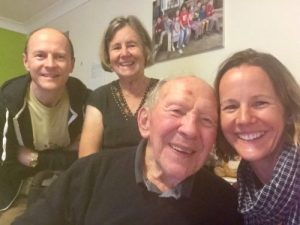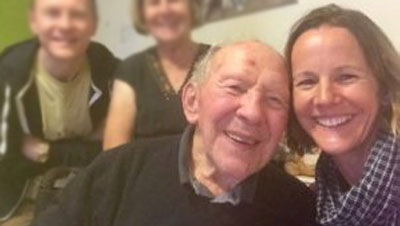 Rachel Evans
Rachel Evans
Blog Post
My Dad was the type of man whom held the attention of a room full of people with his charismatic chat and charm. He was significantly slowed by a massive stroke 20 years ago, but he was still a conversationalist and social individual. He was surrounded by family and friends celebrating his 80th year, when not three months later he was poorly in hospital with very limited communication skills and suffering episodes of acute confusion and states of paranoid delusions.
 Our life was changed once more and we had to adapt to an entirely different set of social rules, trying to understand the nature and functioning of care homes and my Dad’s polar personalities.
Our life was changed once more and we had to adapt to an entirely different set of social rules, trying to understand the nature and functioning of care homes and my Dad’s polar personalities.
Now, quality time spent with my Dad is a visit when he hasn’t snarled at me or attempted to hit or bite me. This is the very sad reality of dementia what I had not fully appreciated. I used to think of dementia and Alzheimer’s disease as a sad process that steals an individuals memory of loved ones; but allows them to nostalgically regress to a time of childhood happiness. My Dad can be passively content or very agitated and aggressive with no obvious trigger factor, making providing care very challenging to the careers that do an amazing job within the care home.
Consent for such an individual is obviously a difficult process. Clearly with a rapidly progressive dementia unfortunately no prior written directive for care was produced and capacity to consent is now lacking. Consent for tooth brushing or meeting basic needs has to be carefully negotiated. Other care has to be provided under the principle of Best Interest. The legalities may be different across the UK with regard to consent and assessing patient capacity, but the fundamental principles remain the same when applying the concept of providing treatment within the patient’s best interest.
 With an estimated 850,000 individuals living with dementia in the UK, health professionals need to be confident in their understanding of the legal framework and ethical standards that will help them to make the correct treatment decisions for their patients. We can offer insight into my Dad’s previous health care decisions and aspirations of how he wished to be treated, but ultimately those providing treatment have to consider these facts along with the risk of monitoring or providing treatment and the urgency of any care intervention.
With an estimated 850,000 individuals living with dementia in the UK, health professionals need to be confident in their understanding of the legal framework and ethical standards that will help them to make the correct treatment decisions for their patients. We can offer insight into my Dad’s previous health care decisions and aspirations of how he wished to be treated, but ultimately those providing treatment have to consider these facts along with the risk of monitoring or providing treatment and the urgency of any care intervention.
If my Dad were to require an extraction he would need a general anaesthetic, necessitating a multidisciplinary team to weigh up the risk of anaesthetic, clinical holding, admission to hospital and balance this against the benefit of treatment. A formal best interest meeting would enable discussions to take place and I am sure this would be a difficult decision for us all to reach. Without family, an Independent Mental Capacity Advocate would be allocated to be the decision maker in England and Wales to decide upon treatment within the patient’s best interest. In Scotland an appropriately trained and qualified practitioner can issue a Certificate of Incapacity lasting for up to 3 years, enabling specific treatment to be carried out for an individual.
My Dad may be lost in a confusing and sometimes distressing place within his mind, but we still love him dearly and unconditionally. However, those providing care may find him difficult and agitated, but it is imperative that he is still treated with kindness and compassion and that they remember that he is not an aggressive man but someone suffering from a destructive disease process.

